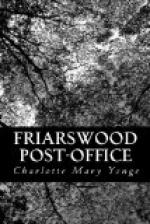Harold came home in better humour, but a fresh vexation awaited him. Mrs. King would not let him go to the hay-home supper in the barn. The men were apt to drink too much and grow riotous; and with her suspicions about his new friend, she thought it better to keep him apart. She was a spirited woman, who would be minded, and Harold knew he must submit, and that he had behaved very ill. Ellen told him too how much Alfred had been distressed about the pony, and though he would not shew her that he cared, it made him go straight up-stairs, and with a somewhat sheepish face, say, ’I say, Alf, the pony’s all right. I only gave him one cut to get him off. He’d never go at all if he didn’t know his master.’
‘He’d go fast enough for my voice,’ said Alfred.
‘You know I’d never go for to beat him,’ continued Harold; ’but it was enough to vex a chap—wasn’t it?—to have Mother coming and lugging one off from the carrying, and away from the supper and all. Women always grudge one a bit of fun!’
‘Mother never grudged us cricket, nor nothing in reason,’ said Alfred. ’Lucky you that could make hay at all! And what made you so taken up with that new boy that Ellen runs on against, and will have it he’s a convict?’
‘A convict! if Ellen says that again!’ cried Harold; ’no more a convict than she is.’
‘What is he, then? Where does he come from?’
‘His name is Paul Blackthorn,’ said Harold; ’and he’s the queerest chap I ever came across. Why, he knew no more what to do with a prong than the farmer’s old sow till I shewed him.’
‘But where did he come from?’ repeated Alfred.
‘He walked all the way from Piggot’s turnpike yesterday,’ said Harold. ‘He’s looking for work.’
‘And before that?’
’He’d been in the Union out—oh! somewhere, I forgot where, but it’s a name in the Postal Guide.’
‘Well, but you’ve not said who he is,’ said Ellen.
‘Who? why, I tell you, he’s Paul Blackthorn.’
‘But I suppose he had a father and mother,’ said Ellen.
‘No,’ said Harold.
‘No!’ Ellen and Alfred cried out together.
‘Not as ever he heard tell of,’ said Harold composedly, as if this were quite natural and common.
‘And you could go and be raking with him like born brothers there!’ said Ellen, in horror.
‘D’ye think I’d care for stuff like that?’ said Harold. ’Why, he sings—he sings better than Jack Lyte! He’s learnt to sing, you know. And he’s such a comical fellow! he said Mr. Shepherd was like a big pig on his hind legs; and when Mrs. Shepherd came out to count the scraps after we had done, what does he do but whisper to me to know how long our withered cyder apples had come to life!’
Such talents for amusing others evidently far out-weighed in Harold’s consideration such trifling points as fathers, mothers, and respectability. Alfred laughed; but Ellen thought it no laughing matter, and reproved Harold for being wicked enough to hear his betters made game of.




